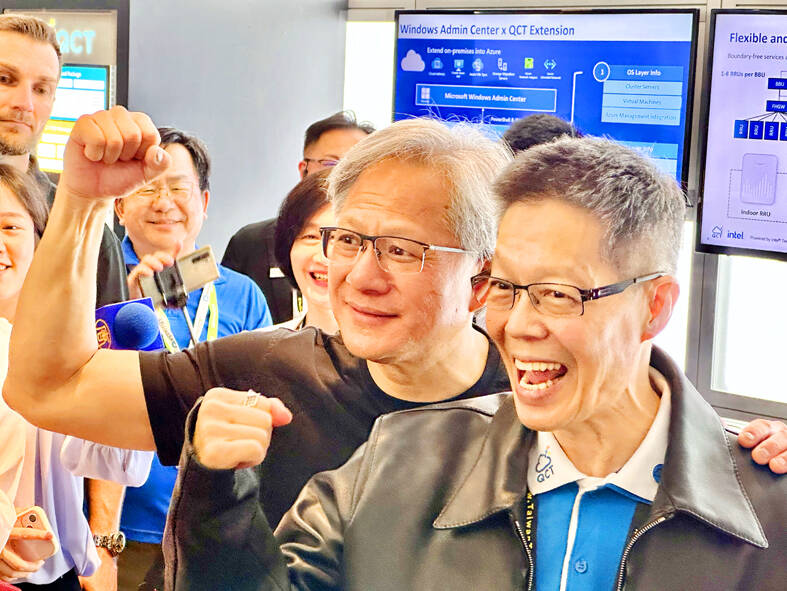Nvidia Corp’s partner Quanta Cloud Technology (QCT, 雲達科技) expects to double sales of its artificial intelligence (AI) servers next year and for long-term demand to persist as businesses weave AI into their operations and services.
QCT president Mike Yang (楊麒令) said in a Bloomberg Television interview that the AI boom “actually is going to maintain and you’ll see its growth keeping stronger and stronger for the upcoming years.” QCT is the owned subsidiary of Quanta Computer Inc (廣達電腦).
Quanta Computer, which works with Nvidia to build AI servers, has benefited greatly from Wall Street’s bet on the technology being the next big thing. Like its Santa Clara, California-based chipmaking partner, Quanta’s share price has more than doubled this year.

Photo: Fang Wei-chieh, Taipei Times
Component providers are working together to boost production capacity and help alleviate an ongoing shortage of Nvidia’s cutting-edge AI chips, Yang said, without committing to fulfilling all demand from customers by next year. Nvidia executives told analysts last month they were confident of expanding supply to meet heightened demand.
“We have a very much limited supply, but next year I think Nvidia will solve everything,” Yang said.
QCT generates billions of dollars in revenue annually, with AI servers accounting for 65 percent of its total sales, Yang said. He differentiates AI servers as those that include graphics processors, such as models made by Nvidia, versus traditional processor-driven hardware where Intel Corp still has a dominant share.
Alphabet Inc’s Google Cloud, Amazon.com Inc’s AWS and Alibaba Group Holding Ltd (阿里巴巴) are among QCT’s biggest customers. The company competes with the likes of Shanghai-listed Foxconn Industrial Internet Co (工業互聯) and Taiwanese peer Wiwynn Corp (緯穎科技) to provide servers for cloud service providers, mainly in the US and China.
Global shipments of AI servers are expected to grow at a compound annual rate of 29 percent between last year and 2026, according to Taipei-based research firm TrendForce Corp (集邦科技). Estimates from analysts and researchers have been overly conservative this year, as Nvidia has in successive quarters shocked the market with blowout sales forecasts.
Yang enjoyed a moment in the spotlight in late May when Nvidia CEO Jensen Huang (黃仁勳) visited QCT’s booth at the Computex trade show in Taipei. Huang offered his signature leather jacket for Yang to wear during their joint marketing event. Yang said that the two companies first started working together to develop server products in 2015.
Like many other manufacturers, Yang is keeping a wary eye on the US-China trade conflict. The executive said QCT is looking to grow its production lines in the US, Germany and Thailand, while maintaining existing capacity in China, though he also said firms cannot afford to dismiss China as a major market.
“I still believe China is the biggest market,” Yang said. “I do believe people will still focus on both. China and the rest of the world.”

A proposed 100 percent tariff on chip imports announced by US President Donald Trump could shift more of Taiwan’s semiconductor production overseas, a Taiwan Institute of Economic Research (TIER) researcher said yesterday. Trump’s tariff policy will accelerate the global semiconductor industry’s pace to establish roots in the US, leading to higher supply chain costs and ultimately raising prices of consumer electronics and creating uncertainty for future market demand, Arisa Liu (劉佩真) at the institute’s Taiwan Industry Economics Database said in a telephone interview. Trump’s move signals his intention to "restore the glory of the US semiconductor industry," Liu noted, saying that

On Ireland’s blustery western seaboard, researchers are gleefully flying giant kites — not for fun, but in the hope of generating renewable electricity and sparking a “revolution” in wind energy. “We use a kite to capture the wind and a generator at the bottom of it that captures the power,” said Padraic Doherty of Kitepower, the Dutch firm behind the venture. At its test site in operation since September 2023 near the small town of Bangor Erris, the team transports the vast 60-square-meter kite from a hangar across the lunar-like bogland to a generator. The kite is then attached by a

Foxconn Technology Co (鴻準精密), a metal casing supplier owned by Hon Hai Precision Industry Co (鴻海精密), yesterday announced plans to invest US$1 billion in the US over the next decade as part of its business transformation strategy. The Apple Inc supplier said in a statement that its board approved the investment on Thursday, as part of a transformation strategy focused on precision mold development, smart manufacturing, robotics and advanced automation. The strategy would have a strong emphasis on artificial intelligence (AI), the company added. The company said it aims to build a flexible, intelligent production ecosystem to boost competitiveness and sustainability. Foxconn

STILL UNCLEAR: Several aspects of the policy still need to be clarified, such as whether the exemptions would expand to related products, PwC Taiwan warned The TAIEX surged yesterday, led by gains in Taiwan Semiconductor Manufacturing Co (TSMC, 台積電), after US President Donald Trump announced a sweeping 100 percent tariff on imported semiconductors — while exempting companies operating or building plants in the US, which includes TSMC. The benchmark index jumped 556.41 points, or 2.37 percent, to close at 24,003.77, breaching the 24,000-point level and hitting its highest close this year, Taiwan Stock Exchange (TWSE) data showed. TSMC rose NT$55, or 4.89 percent, to close at a record NT$1,180, as the company is already investing heavily in a multibillion-dollar plant in Arizona that led investors to assume